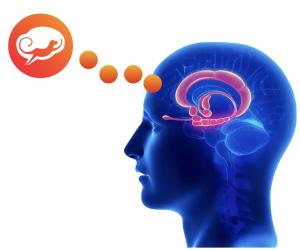Happy brain chemicals managed naturally by Inner Mammal Method
Dopamine, serotonin, oxytocin, and endorphin can be stimulated in healthy ways when you know the job they do in animals.
The chemicals that make us feel good are inherited from earlier mammals, she explains. Dopamine, serotonin, oxytocin, and endorphin reward an animal with a good feeling when it does something good for its survival. But the brain defines survival in a quirky way, which is why our emotions don’t always make sense to our conscious verbal brain.
We control our chemicals with mammalian brain structures that cannot process language, so they can’t tell you in words why they release a chemical. “Our two brains are literally not on speaking terms,” Breuning says. In the words of neuroscientist Steven Pinker, your human neocortex lacks “insider information” about the limbic brain it’s attached to.
This is why humans have struggled to make sense of their emotions since the beginning of time. Today, we rely on the disease model of mental health for that purpose. It takes happiness as “normal,” and painful emotions as evidence of a disorder that treatment can fix.
The disease model has led millions of people to believe that they have a disorder. In December, the US Surgeon General declared a “mental health crisis.” He based this on self-reported data, such as “seeking help” and reporting distress on surveys. Breuning suggests that people have been taught to diseasify natural ups and downs. “You’ve been taught to expect professionals to fix your brain the way they fix your car. We are better off knowing that happiness is a learned skill. If you didn’t learn it yesterday, you can learn to manage your happy chemicals today.”
The disease model began with the first psychotropic drug in the 1950s, and grew with each new behavioral medication. The long-term risks of these drugs have gotten little attention, but evidence has accumulated in volumes with titles like Let Them Eat Prozac and Psychiatry Under The Influence. In January, a PBS documentary called Medicating Normal described severe side effects of popular anxiety, depression, and attention-deficit medications. Yet millions of people see no alternative for managing distress.
The Inner Mammal Institute provides an alternative, based on Breuning’s book, Habits of a Happy Brain: Retrain your brain to boost your serotonin, dopamine, oxytocin and endorphin levels. It explains why happy chemicals are not meant to flow all the time, and what stimulates each of them in the state of nature.
Neurons connect when these chemicals flow, which wires you to repeat behaviors that made you feel good in your past. The superhighways of your brain are built in youth when you have a lot of the paving material, myelin. The Inner Mammal Method helps you discover the pathways you built from early experience with each chemical. “That frees you to blaze new trails to your happy chemicals instead of repeating yourself,” Breuning says.
Life is hard because happy chemicals are released in short spurts that are quickly metabolized. You always have to do more to get more. This helped our ancestors forage for survival, but it creates a frustrating treadmill feeling if you don’t understand it. Knowing the facts helps to build realistic expectations instead of presuming that everyone else is happy all the time and you are missing out.
The Inner Mammal Method helps people manage the “stress chemical,” cortisol, as well. All animals produce cortisol. It makes you feel like your survival is threatened so you focus on making it stop. Neurons connect when cortisol flows, which wires you to turn it on fast when you see something similar to past cortisol moments. Breuning trains people to “find the pattern in your old wiring, so you see that your threatened feelings are just internal chemicals rather than external threats. You can train your mammal brain and your human brain to work together like a horse and rider.”
The Inner Mammal Institute offers a wide range of resources that help you make peace with your inner mammal. Most of them are free.
Loretta Graziano Breuning
Inner Mammal Institute
+1 510-499-2039
loretta@innermammalinstitute.org
Visit us on social media:
Facebook
Twitter
LinkedIn
Other
You Have Power Over Your Happy Brain Chemicals
Legal Disclaimer:
EIN Presswire provides this news content "as is" without warranty of any kind. We do not accept any responsibility or liability for the accuracy, content, images, videos, licenses, completeness, legality, or reliability of the information contained in this article. If you have any complaints or copyright issues related to this article, kindly contact the author above.


